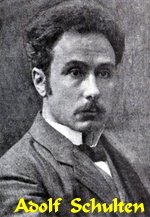Huelva
Fernández Díaz, Fernando
Fernando Fernández Díaz is the Spanish author of two [1808/9] Atlantis related books. One of his startling claims is that he has proven “the Iberian roots of Greek myths and culture.” He identifies Atlantis with Tartessos and places it at Huelva at the mouth of the Tinto and Odiel Rivers. Not contend with that, he has also moved Troy to Iberia in his Cómo encontramos la verdadera Troya (y su Cultura material) en Iberia (How we find the real Troy (and its material Culture) in Iberia.). Understandably one reader described his work as ‘highly speculative‘.
Huelva
Huelva is a city in southwest Spain that has frequently featured in the search for Tartessos. Adolph Schulten(a) as well as Jorge Bonsor devoted years to studying Huelva, Cádiz and Seville in their search for the legendary city. Even if Tartessos is conclusively identified, it is still a long way from proving it to be Plato’s Atlantis, which after all is supposed to be submerged. I was recently offered satellite images that purported to show traces of ground features that ‘might’ indicate ancient ruins with a remote possibility that they might be part of Tartessos!
(a) https://www.uv.es/~alabau/situacion.htm (Sp) (link broken Mar 2019 See: https://web.archive.org/web/20161217151230/https://www.uv.es/~alabau/situacion.htm
Schulten, Adolph
Adolph Schulten, (1870-1960), was born in Hamburg, Germany. He was a historian and  archaeologist who rediscovered the ancient Iberian city of Numantia which had been destroyed by the Romans in 134 B.C. and lost for hundreds of years. Schulten was possibly the first to propose, in the early 20th century, that Tarshish mentioned in the Bible was a reference to Tartessos, a cultural centre located in South West Spain and extending across the Strait of Gibraltar into Morocco. He went further and proposed that Tartessos was in fact Atlantis or at least an Atlantean colony.
archaeologist who rediscovered the ancient Iberian city of Numantia which had been destroyed by the Romans in 134 B.C. and lost for hundreds of years. Schulten was possibly the first to propose, in the early 20th century, that Tarshish mentioned in the Bible was a reference to Tartessos, a cultural centre located in South West Spain and extending across the Strait of Gibraltar into Morocco. He went further and proposed that Tartessos was in fact Atlantis or at least an Atlantean colony.
At great personal expense, he spent many years searching for the legendary Tartessos at the mouths of rivers and the cities of Cadiz, Huelva and Seville. However, as Jürgen Spanuth has pointed out, Schulten appears to have dated the demise of Tartessoss to around 500 BC, which was about forty years after Solon’s visit to Egypt, which would imply that Tartessos was not Atlantis.
Schulten wrote a number of articles and books[055], in German, on his investigations. One of his works, Tartessos, in Spanish, can be downloaded from the Internet(a), use your Google translator for English version.
>(a) TARTESSOS.INFO: TARTESSOS DE SCHULTEN (archive.org) (Span) (copy and paste)<
